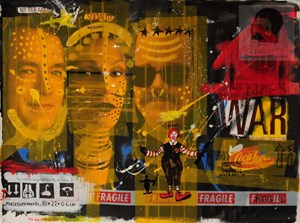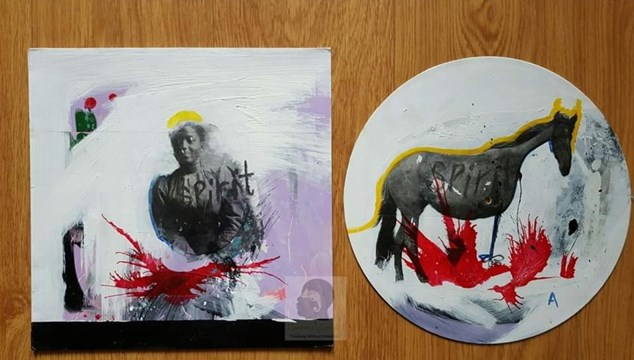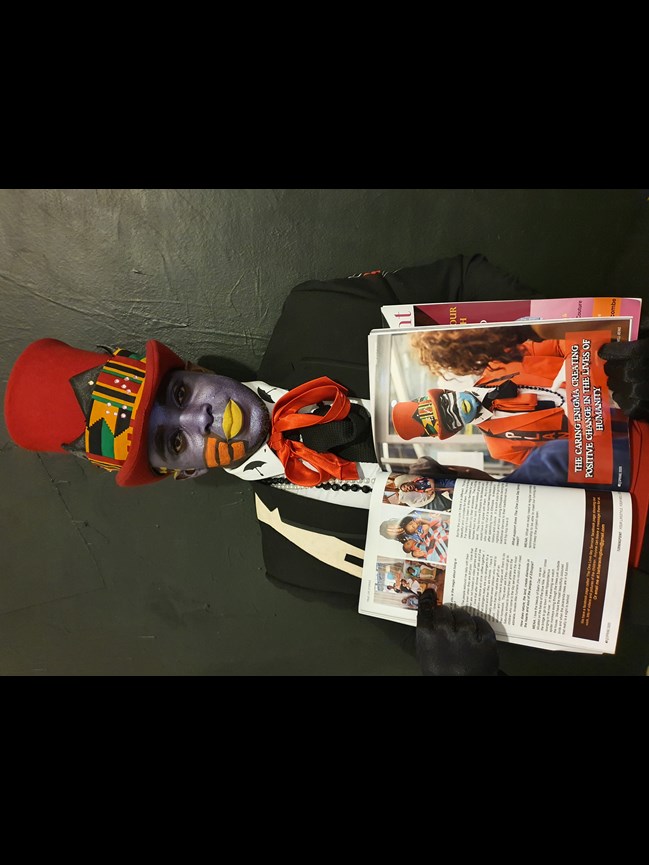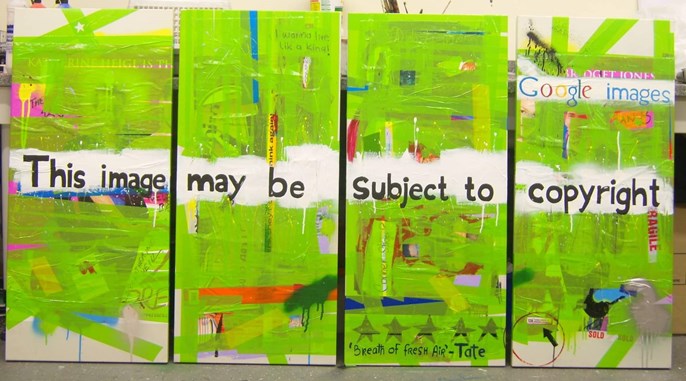
Eugene Ankomah is a visual artist, mentor and personality who is both known for his many innovative but unpredictable styles of art, as much as for his ever changing self created “Art Persona’s”, evolving fashion sense and for his ground breaking public art installations designed to create greater cohesion within the context of knife crime.
Born in London, Eugene Ankomah is a visual artist, mentor and personality who is both known for his many innovative but unpredictable styles of art, as much as for his ever changing self created “Art Persona’s”, evolving fashion sense and for his ground breaking public art installations designed to create greater cohesion within the context of knife crime.
Having shown his work in many countries in Europe, Africa, and the US, he is an Artist with an uncommon natural ability that has seen him successfully enjoyed a professional art career for over 30 years, with many art awards under his belt, including major public and private commissions, coupled with the respect and admiration of followers worldwide.
After completing his secondary education at Willesden High School (London), Ankomah followed a Foundation course at the prestigious Central Saint Martins College of Art & Design. He later also graduated in Illustration and Fine Art at the University of Westminster.
Solo exhibitions, Performances and displays include Buckingham Palace London (Flag design) 2003, Carnaby St. London 2005, Gallery Technohoros Athens 2011, Art House London 2014, Royal Festival Hall, The Windmill London 2015. Ankomah has also exhibited with the annual Screen Nation Awards and his work and profile showed on ITV, the BBC, Sky TV, London Live TV and through other international TV stations amongst others. His work has also been featured widely in other media outlets including the Observer and The Voice Newspaper, not to mention other media in countries such as Germany and Athens.
The works of this prolific artist can be found in the collections of celebrities, including Uri Geller, Colin Salmon, Michael Horovitz and Chiwetel Ejiofor, as well as many private international collections. Eugene Ankomah lives and works in London.

Eugene Ankomah, 'No Words', 2017, Acrylic paint, wrapping tape, Ink and spray paint on wooden panel
Do you have any thoughts on whether that’s a responsibility of artists, reflecting our time is important within the political context?
I totally believe its the duty of the artist to reflect our times, in all its glory and gore - politically.
Nina Simone puts it well when she said "An Artist duty is to reflect the times....I choose to reflect the times and situations in which I find myself. That to me is my duty and in these crucial times in our lives when everything is so desperate. When everyday is a matter of survival, I don't think you can help but be involved... " that statement could have been made for our current uncertain environment.
Every artist contributes and has a vital role to play in society. This includes the overall health and well - being of society. We us creative thinkers have the power to lift ones spiritual awareness, bring joy, create thought provoking critique and even create community engagement, cohesion and healing. I believe artists need to get stuck in! We can't be worried about anything political if we have something to say.
What is your main interest as artist? What form of self-consciousness is applicable to the art-making?
This is an interesting question, as it forces one to "come out" of what might sometimes become a repetitive unconscious production.
One of my main interests is to expand one's consciousness and deepen the sense of connection between a creation, be it a painting, installation or even a performance with the universe, our conscious selves and to try and open doors to knowing ourselves and our creative possibilities as beings. I believe this can be achieved by total commitment and love on my part as a creator. I have to be fully self - conscious of my power us an artist, as this enables me to direct and navigate my expression or message to achieve the result I seek.
Do you feel that it’s important to convey your own beliefs and opinions within your art? Is there a philosophical element in your work?
If we see it, understand it and agree that a piece of art is an expressive language with its own dialect and even an accent which expresses our world in particular ways, ie
who we are (at a particular moment in time) or what we think, then the things we create should convey our beliefs and opinions. In fact I would argue that in many cases an honest artist cannot help it but automatically communicate their beliefs and opinions in their expression. It is in our DNA, we cannot separate ourselves from it. But yes, I also understand that it has to be a very conscious choice to let out.
Arguably an opinion or belief is one way to give personality and reflect one's particular philosophy in the creation, which of course can help to add a unique slant to the final product.
 Eugene Ankomah's Portrait.
Eugene Ankomah's Portrait.
What are you currently working on? Is there anything in particular that you’d like to get across through your work?
At any given time, I am usually engaged in two, three or even four projects at once.
During lockdown I worked and completed many paintings, then suddenly seeing the world wearing surgical masks day in and day out inspired a whole new series of works where the central material is the mask itself. I abandoned my paint brushes for a week and launched into cutting various shapes, forms and text using into surgical masks, using surgical knives. I essentially became a sort of "artistic surgeon", delicately and with precision cutting into these masks and designing artworks which I think the world would understand and gravitate towards immediately. These new mask pieces will act like a sort of "memorabilia" for our Covid times. Humanity in all its complications is the lead!
What place does creativity have in education? Do you view yourself as a creator?
In my head creativity is at the centre of any civilisation that manages to thrive in power over a long period of time. Creativity is how a lot of the things we use and have come to rely on came about. I am not strictly talking about art here. Even technology needs creativity in the way its made, introduced and consumed by its users. Basically the point that I'm trying to make is that without creativity in education, nothing really will move forward in a significant, freeing or connected way that will enable humans to evolve whilst learning to solve problems, or to become critical thinkers with the ability to consider the things we do or engage in.
Do you think that by challenging conventional views, art can truly make a change in the public’s perception?
Yes, I do think art can make a change in public's perception through challenging the known common views or practices. The way I see it is this. The conventions we have come to believe in and practice have yielded certain results, which have also come to create particular set of results or ways of doing things. If we want to create newer greater results, especially those relating to our contemporary times, then its essential we challenge and seek to build upon what we have been taught or known. Sometimes it may even require scraping what we know in order to re-invent. In that sense the challenge can render what we knew before useless or ineffective - within the current context. Furthermore, if the challenge is again founded on principles that are designed to relate to the current concerns and moulded to connect to the public, then yes we can use art to create change - no matter the context or subject.
How has your work developed since you began and how do you see it evolving in the future?
From early on, whilst still a young child I became known for my constant drawing, painting, making things and depiction of my family members, people around and nature. I quickly however in my late teens began to realise through following my gut instincts and experimenting that I had other ideas and abilities that wanted to come out. I then went through my first phase of performance art- creating wild tribal art like costumes, sculptures, drawings and photography. I developed further by adding print making to my overall portfolio. I re-focused later on painting again, but came to it from a different angle and in a different style. I continue to re-invent and experiment today, even with my identity. Over the last two years although I continue to paint quite feverishly, I have developed a series of large scale interactive public installations which deals the knife crime epidemic in the UK, which will continue to various parts of London after lockdown.
I'm currently also working on some large size paintings exploring themes of fear in our contemporary times.
I'm also about to unleash a new persona into the world. He comes with some interesting unexpected art works too.
My tag or strap line 'Creativity Without Limitations' is my constant guide!
Is sophistication, aesthetic accomplishment in the eye of the beholder?
This is quite a simple question, but not so much a simple answer I feel. The simplest answer could be Yes, sophistication, aesthetic accomplishment is in the eye of the beholder. Why?, because we know every viewer comes to a conclusion about a piece of viewed art with a huge mix of their own life experiences and understanding, which cannot be removed from the equation of observing. At the same time, I feel from the perspective of the artist, if the work or creation genuinely holds these qualities by the honesty of creation, ie by way of simplification or raw communication, then ultimately the artist often does have quite a big influence on how the viewer judges the work aesthetically.
What do you think is the social role of art? How would you like to be remembered?
The social role of art for me is that it provides escapism, and being a form of a language that communicates differently, perhaps it aims more to the subconscious, the spirit and speaks to other parts of the human psyche that may be difficult to reach via other means. For these reasons its for me about using art as a tool that should aim to bring togetherness - even if its limited to it being an online experience.
I want my work to lead people into discovering more of themselves than they did previously. I want my creations to open up possibilities and potential in my audience in a way that allows them to connect to unseen parts of them that may have been unknown or laid dormant. I desire to enable my audience to walk away feeling they too can, and not necessarily by them also making art, but to open them up to who they are us personalities and people so they attempt to search within for their own possibilities.
I want to help change or push forward what an artist is and the limitations placed on us, by introducing myself and my art through many dynamic forms.
 Eugene Ankomah, 'This May Be Subject To', (2011), Acrylic Paint, wrapping tape and mixed media on aluminium panels
Eugene Ankomah, 'This May Be Subject To', (2011), Acrylic Paint, wrapping tape and mixed media on aluminium panels
How does art school form ideas about art? Does it shape people into being certain types of artists?
Art school tends to shape its students via a kind of overload of past information of how things were done and less on how things are done now, or how they could be done moving forward. From experience, observation and through conversations, students are often so much encouraged to have or develop a kind of tunnel vision which is focused on given tasks and very much in pursuit of "respectable results" or grades, and less encouraged to really get students thinking critically about the bigger world of art, audience interaction, commerce and how one needs a "thick skin" to survive and even thrive.
So yes I feel like art school largely creates fresh artists who are clueless about the realities of the art world. Many get a real shock once art school is over. The lack of understanding for students means many come out with a very narrow vision of how they move forward.
What do you think about the art world and art market? Do you accept that art is inherently an elitist activity?
Art is obviously a competitive business with high stakes often involved. But I do not believe Art per se is elitist. I think there's more than enough evidence that it appeals to an elitist group people. The idea that its elitist in its own right is a perception. As we know, Art comes in many disguises, popular or not popular. It could be representational or abstract and so forth. But it also appeals to all and every type of person.
What’s the last great book you read? Any other thoughts / projects to share?
The last great book I read was Think and Grow Rich, by Napoleon Hill. I had heard about this book many times. I had even read snippets, which I found intriguing but truthful. Diving into the whole book was such a treat! Lots of wonderful food for thought and positivity.
In line with my constant questioning of identity and my shifting personal identity as an artist, I shall be unleashing a new persona named 'MP' to front a new series of unique works.
I am also exposing my musings more and hope to engage my audience with my philosophical writings and what some may consider a kind of conceptual poetry.
In general, I am always excited about the wonderful ideas I pick up from life. I am always eager to make and share with everyone!

ArtDependence Magazine is an international magazine covering all spheres of contemporary art, as well as modern and classical art.
ArtDependence features the latest art news, highlighting interviews with today’s most influential artists, galleries, curators, collectors, fair directors and individuals at the axis of the arts.
The magazine also covers series of articles and reviews on critical art events, new publications and other foremost happenings in the art world.
If you would like to submit events or editorial content to ArtDependence Magazine, please feel free to reach the magazine via the contact page.